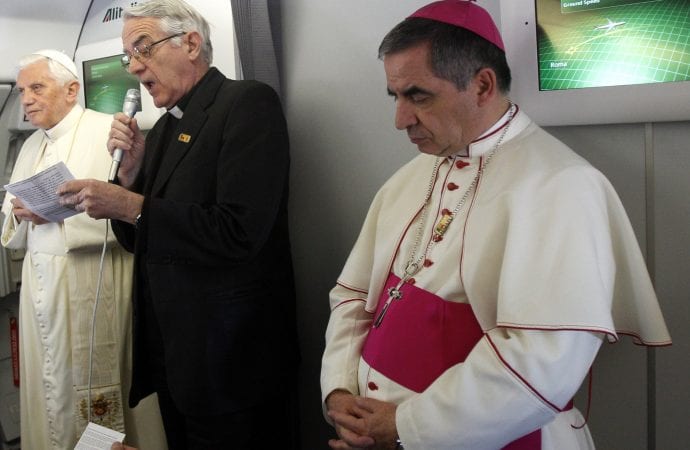A cardinal who once held one of the highest-ranking positions in the Vatican said Thursday that Benedict XVI’s controversial comments on the clergy abuse crisis were motivated by a desire to help Pope Francis, and that it would be “the greatest suffering” for Benedict to be perceived as contradicting his successor.
“I interpret [the letter] as the reflections of a man who, before this terrible scourge of pedophilia in the Church, attempts to help Pope Francis and all of us to emerge from it,” said Italian Cardinal Giovanni Becciu.
“It doesn’t go against Pope Francis, because he does not suggest legislation,” Becciu said. “It would be the greatest suffering for Benedict to be perceived as in contradiction with Pope Francis.”
Last Sunday, Becciu also said gay people should not become priests and suggested financial penalties for whistleblowers who betray Vatican secrets.
“Those with homosexual tendencies would do well not to remain in the seminary and become a priest,” said Becciu, a former sostituto, or deputy, of the Vatican’s Secretariat of State, in a lengthy interview with journalist Fabio Marchese Ragona that aired April 8.
Becciu said priests live in close contact with men, especially in religious communities, which puts a strain on their vow of chastity. How can he “easily live out the promised chastity,” the cardinal asked, if he is constantly sharing “time and space” with people of the same sex?
“Isn’t that asking too much of him?” he added.
For those with homosexual tendencies who are already priests, bishops or cardinals, Becciu suggests the same “severity” adopted in cases concerning heterosexual clergy.
“One will have to demand that he observe the priestly promises and, if he were not able, or furthermore brought scandal, it will be necessary for the good of the Church that he retire to private life,” he said.
Becciu, who was the sostituto under Emeritus Pope Benedict XVI and Pope Francis from 2011 to 2018, closely experienced the two Vatileaks cycles, which he described as “dark days” where suspicion was rampant and “a world was collapsing.”
“Pope Francis and Pope Benedict suffered a lot before such betrayal,” he said. “There were not, and are, no motivations that can justify such behavior. It solely derives from power dynamics, it’s born from frustrations, jealousies, revenge and for some financial ambitions.”
In a context where he said a “sense of belonging” in the Church is dissipating along with the willingness of priests “to suffer quietly,” Becciu suggested the Vatican adopt deterrent measures that would make whistleblowers “pay out of their own pocket.”
“The sub gravi oath is no longer binding, and the pontifical secret has lost its meaning,” he said. “I ask myself if the time has not come for the Vatican to also adopt a system, used in attorney offices and other civil entities, of a financial penalty in the case of violation of the professional secret.”
The cardinal said that when he was the Vatican deputy, he asked that this proposal be considered and expressed the hope that today it’s going forward.
The text of Becciu’s interview can be found in the second chapter of Francis’s New Cardinals, which contains 25 conversations with all the cardinals made by Francis and eligible to vote in the next conclave. The book, written by journalist Fabio Marchese Ragona , was presented at a press conference near the Vatican April 11.
“It was a moment of concern, trepidation and suffering,” Becciu told attendees at the conference referring to the moments following the Vatileaks. “Now, several years later, I think that in God’s Church nothing happens by chance.”
“Because this happened now, there is a new look to the Church and a new style of government,” he added pointing to Francis’s concern for the poor and the peripheries.
Concerning sexual abuse by clergy, which was discussed by heads of bishops’ conferences around the world during a February summit at the Vatican, Becciu said that it’s necessary to “no longer hide” but added that reporting abuse to civil authorities must vary from country to country.
“Pedophilia is a tsunami for the Church,” he said. “Had it happened in one country, in one area… but no, it happened in all nations. Why did our ecclesial structures produce such men?”

